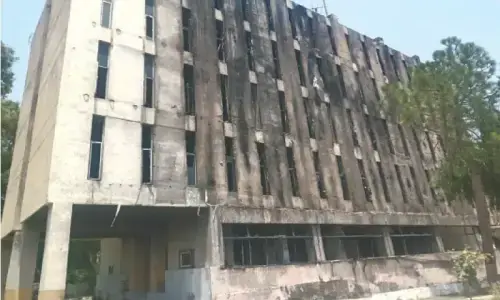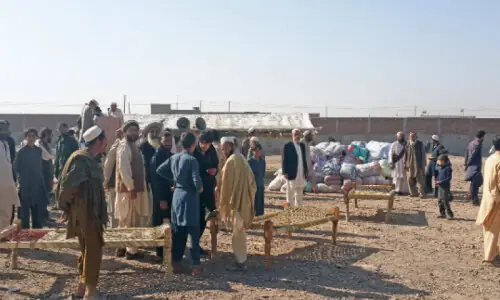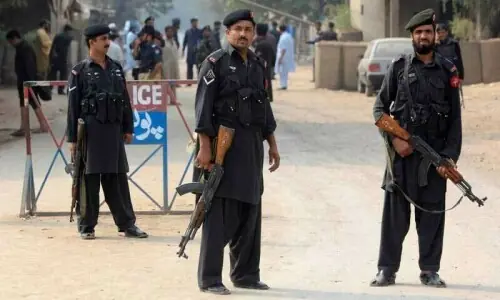Tribal elders and political leaders from Bara were bewildered and speechless when Khyber Agency political agent Shahab Ali Shah told them during a recent jirga at the sprawling lawns of the British era Khyber House in Peshawar that the time for negotiations with militant groups operating in the restive tehsil was over and that militants had no option but to either lay down arms or face military crackdown.
This was in fact the start of yet another military offensive in Bara over the last 10 years against all banned militant and outlawed groups.
Given the code name ‘Khyber-1’, the operation began with air strikes against Lashkari- Islam hideouts in areas under the Mangal Bagh-led group’s control in Tirah and Bara, killing 21 militants and destroying their three key bases.
The political agent told the jirga that the purpose of convening tribal elders was to apprise them of the government’s decision to launch military operation in Bara and not to seek their advice on how to tackle the situation.
“The elders of Bara shall fulfil their responsibilities under the Collective Territorial Responsibilities clause of the Frontier Crimes Regulation and try to prevail upon militant groups and their sympathisers to refrain from putting up resistance during the Khyber-1 operation and instead voluntarily surrender,” he told Bara elders, who later left the Khyber House in a state of indecision as they expressed their inability to convince militants to accept the government’s writ in the tehsil.
Though the political administration had not specifically mentioned Lashkar-i-Islam as the only target of the Khyber-1 operation, it has claimed on a number of occasions that it was against all outlawed militant outfits operating in Bara.
And the record showed that all major offensives were launched against LI bases in Malikdinkhel, Akkakhel, Kamarkhel and Sipah areas.
“Had it been an across-the-board military operation, security forces would also have targeted other militant groups in Bara, especially Haji Namdar group in Bar Qambarkhel and LI staunch opponent Ansarul Islam in parts of Tirah valley,” observed local analyst Murad Saqi.
Murad Saqi said he had apprehensions about the success of the Khyber-1 operation.
“We want to know why the government is reluctant to reveal the ‘successes’ of the two much-trumpeted military operations of the past in the area, ‘Daraghlam’ (here I come) and ‘Biya Daraghlam’ (here I come again), carried out in 2007 and 2009 respectively,” he said.
Similar views were expressed by Hashim Khan Afridi, a political worker and former agency councilor.
Afridi said the government never took Bara elders into confidence about the start of any military operation in Bara nor were they informed about the achievements of security forces against militants in the past.
He asked, “why shall the political administration expect help and support of tribal elders when they are intentionally kept in the dark about such major offensives, which affect the entire Bara population?” And as was apprehended by former councilor Hashim Khan Afridi, Khyber-1 also like the previous military operations has adversely affected ordinary citizens of Bara, especially those of Spin Qabar, Jansi, Mandi Kas, Dhora, Shiekhabad and Gharreeza in Sipah area, Nala, Kohi, Fort Salop and Nawiya in Malikdinkhel area, Dro Adda, Sheen Drand, Kalanga and Merikhel in Akkakhel area and Allah Dhand, Lala Cheena and Exchange Adda in Kamarkhel.
Security forces had blocked all entry and exit points of Bara at least two days ahead of the Khyber-1 operation.
The move had left most residents of the above mentioned localities confined to their homes.
With the escalation in clashes between security forces and LI activists along with intensified indiscriminate shelling of LI hide outs by the security forces, Bara residents were left with no other option but to leave their houses in desperation and chaos despite imposition of curfew by the security forces.
With all roads blocked by security forces, majority of the fleeing families opted to walk on foot for several hours over rough terrain and in harsh weather to reach Jamrud and Peshawar.
Many were compelled to take shelter in narrow streets and deserted houses when gunship helicopters conducted low flights over parts of Akkakhel, Malikdin Khel and Sipah areas in order to locate LI activists and their hideouts.
According to figures released by the Fata Disaster Management Authority, over 6000 families have left their houses in Bara since the start of Khyber-1 military operation on October 16.
The initial influx started from Akkakhel and Sipah areas of Tirah where Air Force fighter planes targeted LI positions on the first day of the operation.
The FDMA said it had established registration points in Orakzai Agency, Jamrud and Sarband area of Peshawar in order to register every displaced family and provide them with free transport and cooked food along with vaccinating children under the age of five against the crippling disease of polio.
Of this year’s 46 polio cases from Khyber Agency, 43 were reported in Bara this year as the banned militant group LI had threatened to ‘break the legs of health workers’ if they ever dared enter Bara for administering anti-polio vaccine to local children.
Officials of the Fata Disaster Management Authority said they were yet to establish new camps for the new IDPs from Bara but at the moment they were trying to accommodate them in Jalozai camp near Nowshera and Togh Sarai camp near Hangu.
They said once the process of all the new IDPs was completed, they would make future strategy.
The FDMA offi cials insisted they were not forcing any IDP to go to a particular place and it was entirely the IDPs discretion as to where they opt to go and reside.
At present some 5000 families from Bara and 1100 families from Upper Orakzai were residing in Jalozai and Togh Sarai camps respectively since 2009.
Affected families from Akkakhel and adjoining areas were seen reaching Batta Thal and Sheikhan areas of Peshawar on foot with loads of their necessary house hold items along with their domestic animals.
They said a large number of these animals had perished on their way while children and women had blisters on their feet due to long distance they covered on foot.
Most IDPs said the indiscriminate mortar shelling compelled them to leave their houses as stray mortar shells hit private houses, mosques and even pick ups which were brining IDPs out of Bara.
Officials of the political administration conceded that at least four persons including two minor brothers were killed and almost a dozen civilians including four women were injured in mortar attacks.
Both security forces and LI activists blamed each other for indiscriminate use of mortar shells during the ongoing military operation.
The fleeing Bara residents refuted the FDMA claims about provision of free transport and cooked food at the three registration points and insisted most of them had yet to be registered and that they were compelled to arrange food and transport for themselves as they’re not provided by the FDMA.
Published in Dawn, October 26th, 2014
































